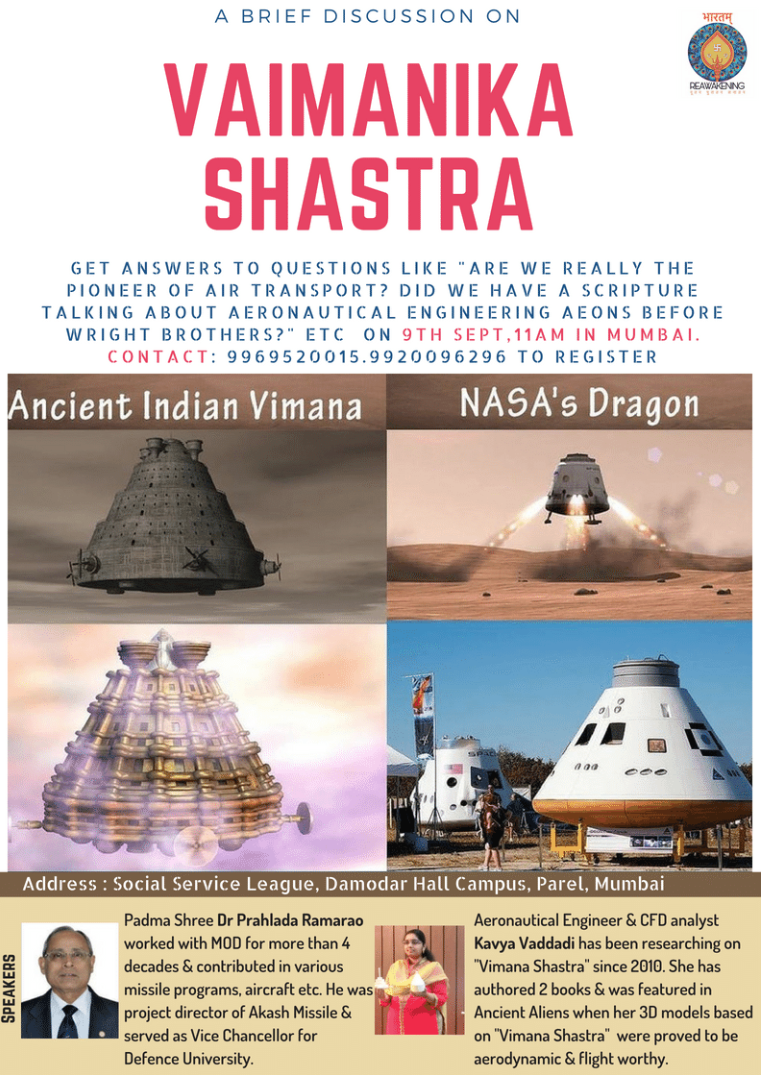Indian Academics Confront the Threat of Nationalistic Pseudoscience
In 1920, Srinivasa Ramanujan, an Indian mathematician, succumbed to what was probably amoebic dysentery at the age of 32. But even though his lifespan was short, Ramanujan’s work continues to influence mathematics today — from number theory and infinite series to continued fractions — and he is just one of many influential Indian researchers whose efforts have helped to form the foundations of science. These include the space scientist Venkatraman Radhakrishnan, and Subrahmanyan Chandrasekhar, co-winner of the 1983 Nobel Prize for Physics.

A poster for the “Vaimanika Shastra” talk was shared on Facebook in August.
Visual: Bharatam Reawakening
None of these individuals, however, were discussed at a lecture in Mumbai in September. Organized by a group called “Bharatam Reawakening,” the meeting — and the group — aim to glorify India’s past and the contributions of their ancestors to the world, even if it means taking a detour into the fantastic and the unlikely. The talk itself was titled “Vaimanika Shastra,” which means “Aeronautical Science” in Sanskrit, and at its heart is the claim that an ancient Indian civilization had developed aeronautical technology centuries before the Wright Brothers flew their first plane. A small but significant number of Indians believe that the mention of flying vehicles in Indian mythology is evidence that such technology was already created by their ancestors.
It’s just one of numerous fantastical ideas, fueled by a toxic mix of misinformation and brewing Indian nationalism, that have long percolated through Indian society. In the northwestern city of Jodhpur, one such theory suggests, there is ample evidence of an ancient nuclear war. And even the country’s own prime minister, Narendra Modi, has claimed that the Hindu god Ganesha — depicted as having the head of an elephant and the body of a human — provides evidence that ancient Indian doctors had mastered cosmetic surgery.
Modi’s bizarre claim notwithstanding, such stories have generally been banished to the scientific fringe. But the Mumbai event, which included among its speakers Prahlada Ramarao, the former chief controller of India’s leading military research agency, suggested to some that these ideas are now creeping perilously close to mainstream scientific circles. “The way [the organizers] opened the session that day was by saying ‘Our religion is in deep trouble,’” said Rohini Karandikar, a post-doctoral fellow at Homi Bhabha Center for Science Education (HBCSE) and a member of a group of Indian activists calling for an end to these sorts of superstitions and conspiracy theories. “That itself was an indication of where this talk was leading.”
It’s a problem that has many academics here worried. As India becomes increasingly polarized, coordinated efforts to popularize pseudoscientific theories, and to aggrandize the nation’s own scientific past, have begun to gain ground, they say. It’s a worrying mash-up of nationalism, religion, and scientific bunkum that appears to be an increasingly easy sell — and one that leaves the population both misinformed and perennially at odds with itself. “That is why our leaders and scientists talk about how evolution is wrong,” said Aniket Sule, an astrophysicist and colleague of Karandikar at HBCSE, “or how Indians were first to invent plane or atomic theory, or how cow worship is scientific.”
Karandikar agreed. “They want to use these claims in science to mobilize people… under the umbrella of religious supremacy,” she said. “For them it is a competition and the need to champion Hinduism.
“I fear that this could lead to a situation where such claims — propagated over and again — might eventually enter our textbooks,” she added. “It is already a ticking time-bomb.”
Such characterizations are not mere hyperbole. In 2014, a department that focused on research into alternative and traditional Indian medicines — including unscientific fields like homeopathy and naturopathy — was elevated in status to the level of ministry and now operates alongside the Indian Ministry of Health. And several attempts have already been made by political leaders to change parts of the national school syllabus to reflect elements of nascent pseudoscience. Earlier this year, Satya Pal Singh, Minister of State for Human Resource Development, called for Charles Darwin’s theory of evolution to be removed from textbooks. “Nobody, including our ancestors, in written or oral, have said they saw an ape turning into a man,” he reasoned publicly. “No books we have read or the tales told to us by our grandparents had such a mention.”
The suggested revisions were strongly opposed by the scientific community in India, but advocates for rationalism in the country warn that more such endeavors will follow. And it’s that conviction that prompted researchers like Karandikar and Sule to help establish countervailing events like National Scientific Temper Day, which honors the slain activist Narendra Dabholkar.
Dabholkar, a doctor and rationalist author, was the founder of the Committee to Eradicate Superstition in his home state of Maharashtra. He was assassinated by two gunmen in 2013.
Several other groups have also taken up the cause of myth-busting. A popular website called Alt News, for example, recently started a section devoted to countering false information in science. Sumaiya Shaikh, the site’s science editor, emphasized the need to counter the spread of pseudoscience quickly, especially in the field of medicine. “The fact that we now have a whole separate Ministry of AYUSH [Ayurveda, Yoga and Naturopathy, Unani, Siddha and Homoeopathy], outside of the Ministry of Health, to focus on alternative or ancient science is concerning,” Shaikh said. “A lot of times many of these medicines are not being tested properly, and are marketed as ‘ancient science’ and assume that our ancestors must have established its efficacy.
“This not only reduces India’s scientific quotient,” she said, “but it also causes real damage — and it’s medical negligence.”
Sule, meanwhile, is preparing a petition to fight against the introduction of a new engineering textbook that endorses the notion of pre-20th-century Indian aircraft, among other claims — including that batteries and electricity were common in ancient India. “There are people close to the current government who feel that the present curriculum for science and history is too Western-centric, and they have to take drastic measures to swing it to other extreme,” Sule said. “It is important for us to stand against any revisions which get introduced without due academic deliberations,” he said, adding that it can “brainwash a generation.”
Karandikar and Sule also make it their mission to attend conferences like the recent one in Mumbai, so that they can challenge the event’s outlandish claims. “We need to put emphasis on the real achievement of Indians in science,” Karandikar said. “There is no need to make up theories glorifying India that have no basis or evidence in reality.”
They had much to confront in Mumbai — including a discourse about India’s deep history of mercury mining. “When Dr. Ramarao spoke about the use of mercury in ancient India… [Sule] asked [him] where in the country did mercury mining happen,” Karandikar said, which triggered an aggressive response from not just the organizer, but also many people in the audience.
A similar question on the validity of funding research into fuels made of donkey urine — another ancient Indian technology — nearly got the activists ejected. “We had to remind the organizers that this was meant to be an intellectual debate,” Karandikar recalled.
The activists were permitted to remain, but Sule says he believes the battle against magical thinking is only just beginning in India. “I strongly believe the ability to ask the right questions is the heart of democracy,” he said. “Unless you don’t know how to question the claims put in front of you, you tend to side with the person who dazzles you the most.”
Ruchi Kumar is an Indian journalist currently working in Kabul, Afghanistan, focusing on news stories from the Afghanistan-Pakistan region. She has been published in Foreign Policy, The Guardian, NPR, The National, Al Jazeera, and The Washington Post, among other outlets.











Comments are automatically closed one year after article publication. Archived comments are below.
Wut is this nonsense
You have to find some excuse to defend a 3000 years of reservation in education and the benefit to human kind is nincompoop. BTW we are just jealous of the achievements of the West and our ego is getting through our skin and it showing up. Now if we did not have that kind of reservation then the Western world would be doing their education in India instead of the other way round. Very clever abstraction just does not cut it.
As an Irishman I presume I run the risk of being perceived by many Indians as a “white slave” – or perhaps worse still, a “white slave master! – but, while I have no idea who Ruchi Kumar is, I would ask all of his detractors above to ask one simple question “Where is the evidence?” . No matter where that evidence originated, check it out – particularly if you think it might be influenced or tainted by its source. Then form a rational conclusion FOR YOURSELF based on the evidence and especially NOT on any prior bias that may have been instilled in you by ANYONE ELSE PARTICULARLY FAMILY OR CO-RELIGIONISTS. Continually check the reasons for your conclusions and exclude any motivation based on desire to be true or, worse still, your childhood brainwashing. That is the sole way that your country can advance. I would suggest you seriously consider my personal contention that religiously motivated beliefs have been the curse of the past millennium and nationalistic beliefs the curse of the past century to all of which you owe no automatic allegiance. Please consider joining the rest of the Human Race as broad minded world citizens.
While yes pseudoscience is big
There are some smart Indian scientists tho like arayabhata
(Alot of non- indian sources think he is right)
Wherever the pre-cursors of modern science originated, they are irrelevant to current scientific investigations.
For example, knowledge of ancient or not so ancient primary sources are not needed to understand the current state of a science.
A physicist need not spend any time reading Newton’s Principia in learning physics today.
Similarly, Mendel’s writings are not part of the syllabus of a course in modern genetics.
If the anti-science/pseudoscience advocates referred to in the article were only interested in the diverse roots of scientific knowledge, and specifically with the Ancient Indian roots of this knowledge, this would be a benign activity.
Unfortunately, they are motivated by religion and nationalism, and question the validity of current science.
White – western slaves like Ruchi Kumar can’t digest the fact that Indians could cite to their own valid indigenous historic scientific resources. These White slaves can’t question for a moment the authencity of Western white historic sources of Archimedes, Pithagoras, Galileo and their likes? Why can’t you question and call these sources as pseudoscience? You can accept the roaming around nude “Eureka” story of Archimedes as indeed science but not the valid scientific theories presented in ancient Hindu scriptures? White slaves like Ruchi are so blinded by the white skin and the European ideals of so called “Science” they will even happily feast on loads of human excrements if a White man calls it a delicacy. It is that kind of slave mentality that these so called journalist mongers are made of. According to these idiots, a scientist can be accepted as a real scientist only if he is recognised as such by a White man or a White institution? If Srinivasa Ramanujam had remained in India and had not left for England, these idiots would even call him as pseudo-mathematician.
well said. These white slaves even doesn’t know difference between Jyotish (astronomy) and Fala-Jyotish( astrology). They even don’t know that Fibonacci series, binomial theorem, trigonometry Metallurgy, plastic surgery and so on are given by Indians. Even toilets are also given by Indians. when looters British arrived in India, India was contributing 24% of world GDP and while departure it was 3% or less.
Govind Haridas, your comment validates Ruchi Kumar’s article.
Ruchi Kumar kudos to you and do keep on highlighting the intellectual bankruptcy of the present political dispensation and their cognitively-challenged followers, the previous gentleman being a prime example.
There is no denying the fact that India has produced, centuries ago, many scholars, scientists, astronomers, mathematicians, philosophers who were far ahead of their contemporaries in the world. However, unfortunately, in most meeting of the above type, they hardly find a mention. By claiming achievements which would not have been there, we not only become a laughing stock but also demean the enormous contributions of some of our great thinkers and scientists.
It is a clash of religions. The Enlightenment spawned a Modernist religion that states “we have never been smarter, richer, technologically savvy than we are today.” In contrast Medieval philosophers harkened back to world where Roman engineering produced engineering feats they could only marvel at–the Coliseum, the aqueducts, the hot-and-cold running water. Not until the 14th century, or 1000 years later, did European lifestyles approach the golden age of Rome. And Rome itself looked back to the 7 wonders of the world that even their engineers marvelled at–the Colossus, the pyramids, the hanging gardens. But in our Enlightened age, we never look back. And like Lot’s wife, we punish those who do.
Nevertheless, there are many examples of lost technology, lost wisdom. The 200-ton blocks of stone that comprise the Great Pyramid of Giza are aligned within 0.1 degrees of north, and so closely spaced that a knife cannot be inserted between them. Such engineering might be accomplished today with cranes the size of the space shuttle, but at an estimated expense of over $1bn. But you know the government–they would probably settle for 1-degree placement and filler concrete. And that’s my point entirely, not only the technology, but the will power was there. Or to say it differently, technology and will power/money are inversely correlated–if the Egyptians did it, it had to involve technology much further along than our own, or a will-power (dare I say purpose?) much more advanced than our own.
Now I segue into a bare-faced commercial. “The Long Ascent” by Robert Sheldon, attempts to trace the evidence to the source of that advanced technology. The first volume makes the case that an advanced civilization lived in the dried-out basin of the Mediterranean from 11,900 – 9590 BC. The 2nd volume (in press) discusses the many maps they left of their homeland. The 3rd volume (in preparation) discusses their technology that built the Pyramids, that flew airplanes to Peru, that mastered gas-core nuclear thrusters. And to my greatest surprise, every ancient mythology turns out to be a story about that race. In fact, all myth (that I have studied) is a retelling of that same history.
If the pyramids were only a legend the author would claim it was impossible the ancient Egyptians could have built them. But there they are, and mainstream academics get a free pass for their inability to explain them. That’s just one example, there are thousands. Pretending they didn’t happen is not an option, and the sheer volume of “inexplicable” ancient scientific achievements argues against dismissing out of hand any one not documented beyond any reasonable doubt.
In the age of CRISPR (& plastic surgery) the modification of humans to become any number of creatures is ongoing.
I saw a program on magnetic pole shifts that stated a possibility of increased eletromagnetic activity in the Earth’s field including more than two magnetic poles and auroras over many regions. Given that our greatest scientific achievements have occurred in a span of roughly 200 years, it is plausible that the ancients might have achieved technological and scientific prowness and tapped into energies and methods similar or different from current technologies. All we have are stories from the past, but there appears to be something there to explore further.
Both the movement you criticize and its attempted negation are wrong. The fact is that genuine discoveries of Indian astronomers, mathematicians, physicists, metallurgists and architects -centuries before their discovery or re-discovery in Europe- are being ignored in India’s STEM curricula. All you have to do is to recognize and reinstate them. You don’t need to embellish them by unproven conjectures and mythical legends. But you DO need to teach ancient Indian discoveries. Examples are the speed of light, the diameter of the Earth, Moon and Sun, the zero, the decimal place value system, Pythagoras’ theorem, infinite series, as well as temple design and architecture, pigments, advanced textiles, incense and perfumes, and hundreds of herbs and spices.
It is CRUCIAL for India’s progress that students take justified pride in India. But exaggerating myths is not the way to do it. NEITHER is the current teaching where everything worthwhile originated in the West.
The ideology that existed since ages with an intention to traumatized the scientific perspective of a comman man which promotes to tie a blindfold with his own hands and believe this ideology as his saviour. This mentality has deviated our country’s direction of advancement.
Ruchi Kumar…you are just another nincompoop masquerading as an intellectual. I ain’t gonna rebutt your article cos I really value my time. One should never recite Vedas in the ears of a buffalo. Whether you and your ilk believe it or not…or subscribe to it or not..India is the Spiritual capital of the world and by default Hindus are the keepers of that glorious legacy.
We rule the country and we will say and do whatever the heck we want to. Liberals like you be damned !!!